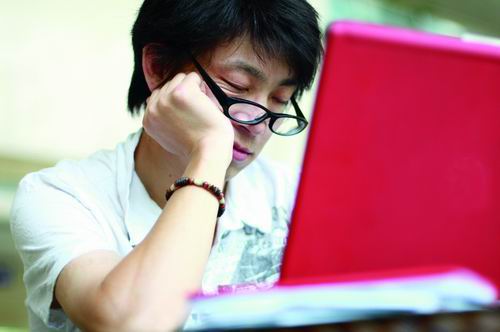|

Anyone who has spent time working in China will have noticed how everything grinds to a halt at lunch time, which lasts from noon to 1:30 p.m. Nothing interrupts lunch. And what follows lunch is a phenomenon that is at first amusing, then irritating and finally simply accepted as the status quo.
This phenomenon is the post-lunch nap or shui wu jiao. It happens right before your eyes - office colleagues will cover themselves with coats and lean back in their chairs, slump over desks resting heads on forearms, or, in extreme cases, hop onto their camp beds, relaxing for a 30-minute snooze. For someone witnessing this for the first time, it's astonishing to see the speed at which a co-worker transitions from open-eyed consciousness, to a deep sleep-state. This change is almost magical in its suddenness.
And offices are not the only places where people indulge in quick afternoon siestas. Take a stroll around any Chinese city after lunch and you're likely to see people sleeping on park benches, in subway stations, on the grass, on chairs in alleyways, in restaurants, on top of parked scooters, in cars and almost anywhere else that can accommodate a sleeping body. Comfort takes a back seat to the act of napping.
Offices at this time of day can take on a soothing silence, with staff who do have to speak doing so in whispers so as not to wake slumbering colleagues. Office lights are also switched off to enhance the sleep atmosphere. Anything that needs to be done will have to wait, and there is no point in trying to buck the system.
But napping is not an arbitrary excuse to slack off. It actually has medical origins. People tend to have low energy after a midday meal due to the enhanced activity of the parasympathetic nervous system, which controls the desire to rest and all activities related to digestion. According to traditional Chinese medicine (TCM), sleeping plays an important role in maintaining a balance of yin and yang, the two complementary principles of Chinese philosophy whose interaction is thought to regulate the energy of everything in existence. Yang is said to reach its peak at noon, when it then transforms into yin, so having a 30-minute nap to reduce activity after lunch is said to promote working efficiency, increase blood circulation and dispel lethargy. In other words, it is a healthy habit and is promoted by the media, hospitals and clinics, along with being passed along from generation to generation.
Take care when interacting with staff or business people who have missed their regular nap, as they can be noticeably lethargic, pale faced and even irritable. It's not you they're upset with, it is the lack of sleep.
As a foreigner you will be regularly encouraged by your office colleagues to grab a few z's after lunch, and told that it is very good for health. When push comes to shove, it's good to keep in mind, if you can't beat them, join them. |